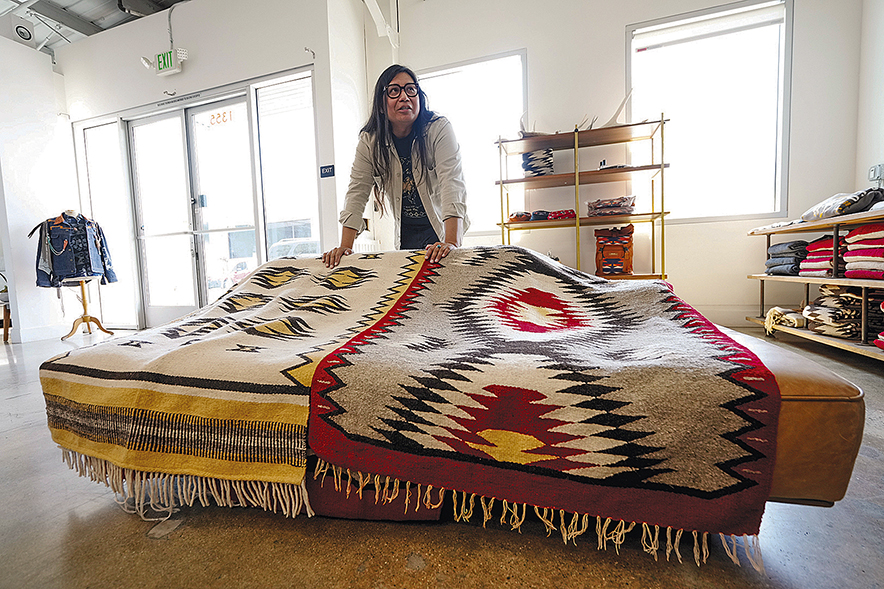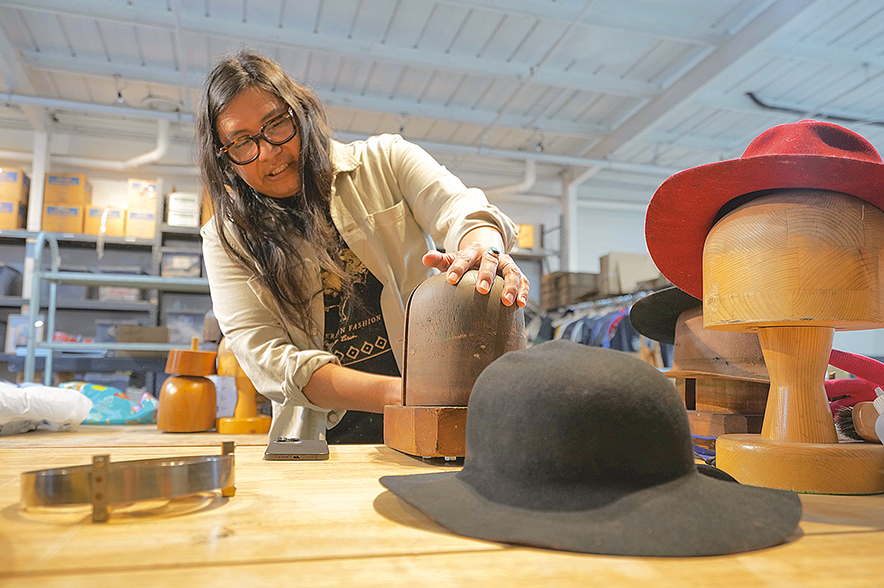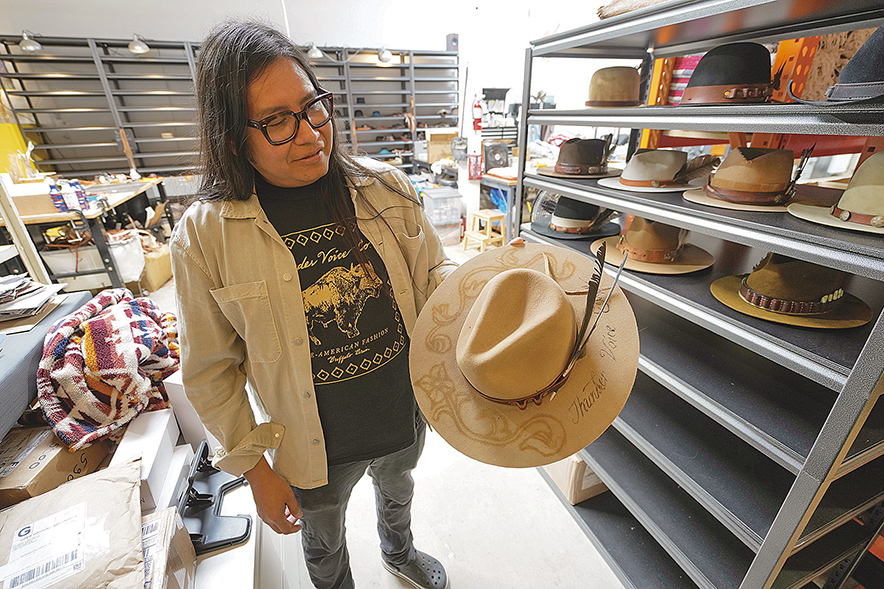
Bodaway-Gap hat maker explores business site lease, bureaucratic complexities

Special to the Times | Donovan Quintero
Thunderhat Voice Company owner Lehi ThunderVoice Eagle, also known as Lehi Sanchez, stands by two Navajo rugs on July 3, in Long Beach, Calif.
By Donovan Quintero
Special to the Times
LONG BEACH, Calif. – Far from the boundaries of the Navajo Nation, a native of Bodaway-Gap, Arizona, has been making high-quality hats and jackets. Lehi Sanchez (also known as Lehi ThunderVoice Eagle), an accomplished artist who made a name for himself in the art world, would probably already be operating a successful company within the Navajo Nation if he could cut through its infamous tribal red tape.

Special to the Times | Donovan Quintero
Thunderhat Voice Company owner Lehi ThunderVoice Eagle, also known as Lehi Sanchez, explains how a hat is stretched on July 3 at his store in Long Beach, Calif.
Sanchez, the founder of Thunderhat Voice Company, specializes in crafting one-of-a-kind hats. His client list ranges from legendary movie director Martin Scorsese to Navajo Nation President Buu Nygren.
His work and artistry have been becoming world-renowned, but a lack of infrastructure back home, combined with a complex red tape tribal bureaucracy popularly known to tribal officials as the 164-process and the business site lease are why he can’t showcase his work to his people.
Sanchez, who is Tábąąhá, and born to Totonac, an Indigenous tribe from Mexico, said he isn’t deterred and has been looking into starting a new business in the Navajo Nation. Instead of just making hats, he said he’s been interested in venturing into other business ventures.
His motivation to explore what options and opportunities are available undeniably exists but the reality of what lies ahead of him in terms of wanting to open a business in the Navajo Nation and committing to it, also undeniably is real.
Alleviating hardships
When the Navajo people returned from Hwéeldi, they lacked a government system recognized by the U.S. government. To help the people recover from four years of imprisonment at Fort Sumner, New Mexico, the government provided more than 15,000 sheep to alleviate the hardships they had endured.
In 1921, following the discovery of oil on the reservation, a council of Navajos entered into oil and gas leases with the Midwest Refining Company. However, these leases were later canceled, leading to the establishment of a “business council” with Chee Dodge serving as chairman. The newly formed Council was primarily tasked with approving oil leases for reservation lands to non-Indian corporations. The discovery of other natural resources on the reservation eventually contributed to the growth of tribal bureaucracy.
When the tribe wanted to use the money it collected from royalties, the young tribal Council had to write resolutions. Since the U.S. government was the steward of the Navajo people, these resolutions were introduced to the Council for debate. If approved by the chairman, the resolutions could then be used to request the Interior secretary to permit the tribe to use its tribal funds in the treasury.
“We had a system that worked for eons, and we worked together with Mother Earth and how we did it,” Sanchez said. “We’re stuck in the middle of that whole system right now. We have, I think, a lot of room to change things in the way that we want to.”
As pressures to use the resources increased, the government adapted its policies and structure to address the complex needs of its community while navigating issues of sustainability and resource management.
For Sanchez, he said he understood he could not navigate the complexities of the tribal business development system on his own.
“I think we’re so concerned about bureaucracy that we never get anywhere. And I think that was intentional, honestly,” he said. “But when I look at it, and I see what is required and how it’s so confusing, and also understanding that we were matriarchal, but they don’t recognize a matriarch as leadership, they kind of mess things up for us.”
And then they give us a whole new government. And now we have to run it with the different tiers which is the way they want.
He met with Tony Skrelunas, the executive director of the Navajo Division of Economic Development, on July 3 at his business in Long Beach, California.
Bureaucratic hurdles
Skrelunas said he was very impressed with Lehi. By removing bureaucratic hurdles and offering tailored support services, he said he aims to empower individuals to realize their business aspirations and contribute to the economic prosperity of the Navajo Nation.

Special to the Times | Donovan Quintero
Thunderhat Voice Company owner Lehi ThunderVoice Eagle, also known as Lehi Sanchez, talks about one of his hat design on July 3, in Long Beach, Calif.
“He’s self-financed everything, he’s never gotten any outside financing. Lehi and others like him, they’re eligible for major financing,” Skrelunas said. “Qualified Navajos, with their equity in an impactful business, a potential big business idea, one that will help preserve the culture, that’s massive.”
He said DED was launching a Navajo Nation Small Business Credit Initiative where they offer low-interest financing through a couple of financing institutions, including the proven Change Labs based in Tuba City.
“A Federal SSBCI program is providing a grant to the Navajo Nation that will enable our partners to provide loan guarantees and loan participation which will be highly impactful to our entrepreneurs. So, someone like Lehi will be eligible to apply for major financing to grow their business,” said Skrelanus.
The DED executive director acknowledged the tribe, while it may be larger than several U.S. states, lacked space.
“Navajo people, we take up space, and for years nothing happens within those spaces,” he said. “The system of leasing and acquiring space has to be changed to enable faster entry.”
Since assuming his role in January 2023 under the leadership of the Buu Nygren-Richelle Montoya Administration, Skrelunas has been dedicated to creating a more conducive environment for Navajo entrepreneurs.
To date, he said approximately 50 new businesses have been successfully launched, marking a significant milestone in the economic development landscape of the Navajo Nation. Speaking on his motivation to streamline the processes for Navajo entrepreneurs, Skrelunas emphasized the importance of providing a supportive ecosystem that nurtures the entrepreneurial spirit prevalent among the Navajo people.
Opening a business in Navajo Nation
Sanchez said he anticipates it could take a couple to a few more years to open a business on the reservation.
“Well, I think for me, understanding that we’re a sovereign nation, we’re appearing to what the outside world is telling us what to do,” he said. “I think that’s an old way of looking at it. So, even the idea of policy and procedure, what it looks like, needs to change completely for us as our nation. Our nation needs to decide what that looks like so that we can thrive.”
To help and guide prospective business owners considering opening a business on the reservation, the Navajo Division of Economic Development website is filled with a plethora of resources and information.
Under the Buu Nygren-Richelle Montoya Administration, the DED’s top priority has been to invest in business development, create sustainable jobs, and strengthen the Navajo workforce. Through developing infrastructure, improving roads, and extending electricity and water lines throughout the Navajo Nation, DED could improve business development and growth.
Skrelunas said DED could help small business owners like Sanchez with manufacturing space.
“We have some now. We’re building one near Fire Rock Casino, and we have some older spaces that need major renovation,” he said. “The Navajo Nation has a lot of land near freeways, pretty much all along Interstate forty, from Twin Arrows Casino to Gallup. So, one of the things we can do is look at that and carve out, and we can allow folks like Lehi with incredible business ideas to thrive.”
Sanchez said his tsééh is buried back in the Bodaway-Gap, Arizona, area, in Western Navajo. His late grandmother Mary Martin, who passed away in 2021, has helped mold him into the artist he is today. While he’s made a name for himself in southern California, his urge to return to his roots and share his successes by opening a business has been calling him.
He said he’s been in conversations with family members and elders, reflecting on when and how he can make that dream come true. He does know the challenges of attempting to try and open a business in the Navajo Nation.
“In the meantime, I believe that within the system, there are ways to quickly change policy and get it done. It just needs to happen,” said Sanchez. “And because I also know another big piece of why it’s so hard to get things pushed through is because we’re a big nation.”







 Highway 264,
Highway 264, I-40, WB @ Winslow
I-40, WB @ Winslow